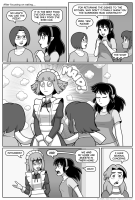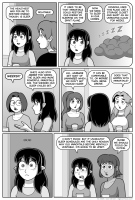Posted by Athena Scalzi
https://whatever.scalzi.com/2026/02/27/sampling-some-smackin-sunflower-seeds/
https://whatever.scalzi.com/?p=59640
 I used to eat sunflower seeds when I played softball as a kid, and I can’t say I’ve ever eaten them since. For some reason, I was getting advertisements for Smackin’ Sunflower Seeds on Instagram. In that moment, I thought, you know what, sunflower seeds sound kind of good to snack on right now.
I used to eat sunflower seeds when I played softball as a kid, and I can’t say I’ve ever eaten them since. For some reason, I was getting advertisements for Smackin’ Sunflower Seeds on Instagram. In that moment, I thought, you know what, sunflower seeds sound kind of good to snack on right now.
I would say in my life I’ve only had regular sunflower seeds, ranch, and BBQ flavored, so when I saw Smackin’s array of flavors, I was certainly intrigued. I am someone who believes variety is the spice of life, so of course I couldn’t choose just one flavor. I went ahead and bought a variety pack that included all their flavors (except the OG Original), and my dad and I gave them all a try.

I let my dad pick the first flavor we tried, and he chose “lemon pepper.” These definitely had a strong flavor, as advertised, and the taste actually reminded me a lot of a steakhouse. The peppery-ness wasn’t overwhelming, and my dad and I gave these ones a 6.5/10.
Up next, we went for a classic: Ranch. The ranch flavor reminded me a lot of a Hidden Valley Ranch seasoning packet, like the kind you mix into dips or salad dressings. Surprisingly, the ranch flavor was very subtle, which is certainly something that ranch never is. You get a Cool Ranch Dorito and that shit is RANCHED UP. In the case of these seeds, I could’ve used more ranch flavor. They were kind of weak, but the flavor that was present was good. These were a 6/10 from both of us.
We switched to a sweet flavor, their Cinnamon Churro. This flavor was actually really nice, it wasn’t just straight cinnamon, it had that nice churro-vanilla sort of flavor. I will say that the flavor wasn’t very long lasting, though. Like it wore off very quickly. The taste, while it lasted, was very nice and not too sweet, with just a little bit of saltiness to have a nice sweet-and-salty factor. This was a 7.5/10 from my dad and a 7/10 from me.
My dad wanted to get the Cheddar Jalapeno out of the way, since he feared it would be really hot and we’re not exactly known for loving spicy stuff. I’m happy to report that while these ones do have a real kick with a heat that lingers just a touch, it has a really nice actual jalapeno flavor and isn’t just hot to be hot. While there’s not so much of the cheddar flavor present, if you’re someone who likes a little bite in their snack, this one would be a great pick for you. I wouldn’t eat a whole bag, but they were pretty tasty. These were a 7/10 from both of us.
Onto Dill Pickle, which was one I was very excited for. Lemme just say, these bad boys were picklelicious. These had a super solid, bold pickle flavor that was very enjoyable and not too acidic, just had that nice dilly briny taste. These ended up being in my top two favorites overall, and we both gave them an 8.5/10.
Over to the Cracked Pepper, I was curious how this would compare to the Lemon Pepper. If you are someone who puts so much pepper on their steak or eggs that people around you are sneezing to high heaven, then this is the flavor for you. These were so peppery, like pretty overwhelmingly so. I honestly didn’t care for them, and gave them a 4/10, but my dad gave them a 6/10.
Next up was the Backyard BBQ. I do love barbecue chips, so I was looking forward to see how these compared flavor-wise. The BBQ was super bold! Just one seed was absolutely packed with BBQ flavor, and it was very tasty! More long-lasting flavor and very strong, these were super good and ended up being another favorite. My dad gave them an 8/10 and I gave them an 8.5/10.
Back to the sweet ones, we tried the Maple Brown Sugar. Like the Cinnamon Churro, they were really nice but not long-lived. They’re a bit subtle, like not a huge amount of maple flavor or anything, but still pretty good. My dad gave them a 7/10 and I went with a 6.5/10. The rating would be a lot higher if the flavor lasted longer or was stronger.
Starting to wrap up our sunflower adventure, Sour Cream and Onion was next. These tasted so classic and recognizable, like if you enjoy sour cream and onion chips, these are for you because they taste absolutely spot on. They honestly reminded me a lot of Philadelphia Cream Cheese Chive and Onion flavor. These were a 7.5/10 from both of us.
The final flavor before trying the mystery flavor was Garlic Parmesan. These were super garlicky, but didn’t offer up a whole lot of parmesan flavor. The garlic really stole the spotlight here, but it was still a tasty flavor, earning it a 7/10 from both of us.
Finally, the mystery flavor! I truly had no idea what to expect. Do you know how DumDums make their mystery flavors? Well, I can only assume that Smackin’ does the same thing, because the mystery flavor tasted exactly like the Cheddar Jalapeno and Ranch mixed together. It was like the Cheddar Jalapeno but less hot, and somehow even better! The mystery flavor earned an 8/10 from both of us.
Well, there you have it! Eleven flavors of sunflower seeds. The only one I didn’t get to try that I would’ve loved to is Cheeseburger! Honestly, these were pretty solid sunflower seeds. It felt kind of nostalgic to eat them, even if they are kind of tedious to get through. I felt like one of those dogs that has a “slow down” bowl because you can’t just plow through them like chips or crackers.
Anyways, if you’re interested in trying some for yourself, I have a 10% off code for you! Yippee!
Which flavor sounds the best to you? Do you eat sunflower seeds often? Let me know in the comments, and have a great day!
-AMS
https://whatever.scalzi.com/2026/02/27/sampling-some-smackin-sunflower-seeds/
https://whatever.scalzi.com/?p=59640

 I used to eat sunflower seeds when I played softball as a kid, and I can’t say I’ve ever eaten them since. For some reason, I was getting advertisements for
I used to eat sunflower seeds when I played softball as a kid, and I can’t say I’ve ever eaten them since. For some reason, I was getting advertisements for 


